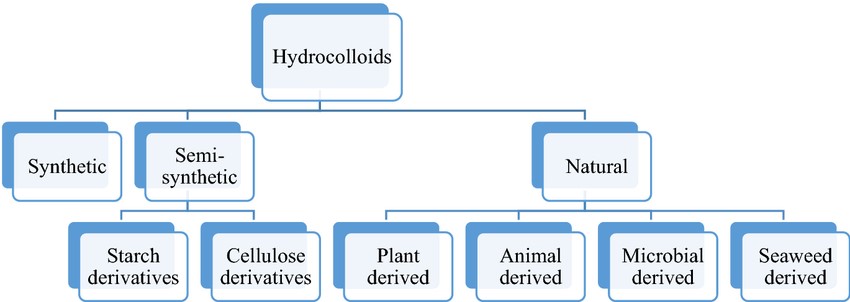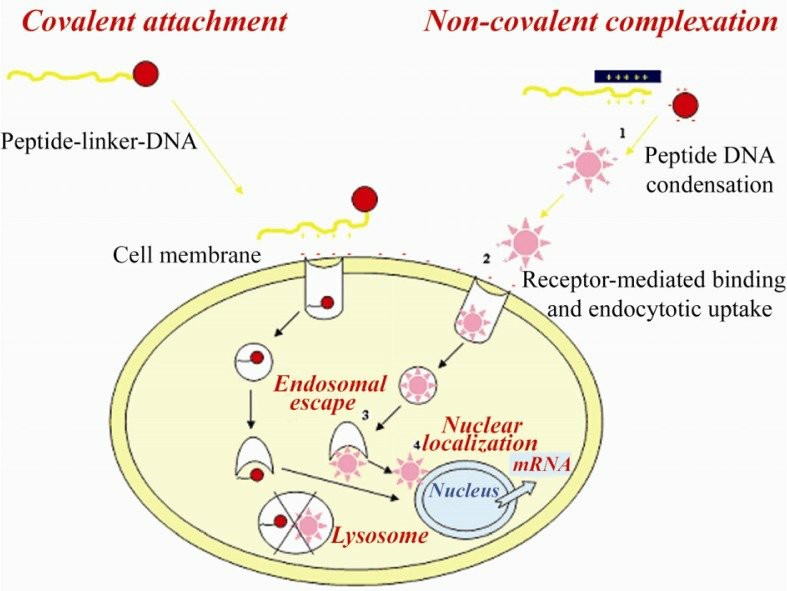Antibody-PNA Conjugation
What is Peptide nucleic acid (PNA)?
Peptide nucleic acid (PNA) is a synthetic polymer similar to DNA or RNA. Various purine and pyrimidine bases are attached to the backbone like a peptide by methylene carbonyl bonds. Because PNAs do not contain charged phosphate groups and lack electrostatic repulsion, PNAs bind more strongly to DNA than DNA to DNA. Recently, PNAs has attracted significant interest because of their unparalleled ability to invade double-stranded DNA. PNA oligomers are conjugated to a ligand which is capable of binding to a cell surface receptor, and the ligand facilitates cellular uptake of PNA oligomers. Thus, PNAs provide an innovative strategy for studying molecular probes and biosensors.
 Fig 1. Peptide nucleic acid (PNA) structure Comparison of the structure of PNA to that of DNA. (Amour, J. B. 2011)
Fig 1. Peptide nucleic acid (PNA) structure Comparison of the structure of PNA to that of DNA. (Amour, J. B. 2011)
Application of Antibody-PNA Conjugation
Antibodies have been widely used to identify cancer-specific molecular abnormalities and thus treat disseminated cancers. Radionuclide molecular imaging would be an effective alternative to biopsy-based methods, and the most commonly used molecular imaging method is the labeling of therapeutic antibodies using positron-emitting nuclei. PNA probes exhibit strong site-specific hybridization in vitro through ligation catalyzed by sortase A to antibodies that can be prepositioned in vivo.
BOC Sciences has developed a novel photolabeling technique for site-specific decoration of antibodies. The Z-domain has a well-characterized binding site in the Fc portion of IgG, and by introducing photoactivated linkers in the Z-domain, covalent bonds can be formed between the Z-domain and the antibody upon the UV light irradiation. Our novel conjugation method enables site-specific decoration and coupling of antibodies with PNA.
 Fig 2. Peptide-based nucleic acid delivery systems. (Bolhassani, A.; Rafati Yazdi, S. 2009)
Fig 2. Peptide-based nucleic acid delivery systems. (Bolhassani, A.; Rafati Yazdi, S. 2009)
Our Antibody-PNA Conjugation Workflow
For the construction of protein-polynucleotide conjugates, we use a biochemical-based conjugation strategy to prepare PNA-antibody conjugates. Our experts label PNA oligonucleotides by employing the most commonly used enzyme that recognizes small molecule tags: Sortase A. The biochemical coupling of antibodies and PNA oligonucleotides can be accessed via self labelling proteins.
Custom PNA Synthesis
BOC Sciences is committed to providing a variety of custom PNA oligonucleotides with high quality. All PNA oligonucleotides are manufactured and managed through strict quality control. Combined with our excellent production technology and long experience in custom PNA oligonucleotide synthesis, our experts are able to provide PNA oligomers that meet our customers' needs.
Synthesis and Purification of PNA Probes
We use solid-phase synthesis method with Fmoc chemistry to prepare PNA hybrid probes with a controlled coupling reaction of 2 h. After the coupling of each amino acid or PNA monomer, the intermediates products are analyzed by mass spectrometry to monitor the synthesis process of PNA probes, and purified by reversed-phase high performance liquid chromatography (RP-HPLC) to obtain the final purity of > 95%.
Sortase A Conjugation of Z domain to the PNA Probes
In our method, antibody is coupled with a PNA via the Z-domain. Site-specific coupling of PNA probe to the antibody is achieved by enzymatically attaching a PNA-based probe to the Z-domain. Desired Z-PNA product can be obtained by HPLC purification process. BOC Sciences has introduce Matrix-assisted laser desorption ionization analysis (MALDI) to confirm the correct Z-PNA conjugates after purification.
Site-specific Cross-linking of Z-PNA to Antibodies
Our teams have excellent expert in photolabeling techniques. Antibodies are photoconjugated to Z-PNA conjugates, and the couples are eluted using affinity chromatography. The affinity of the products is characterized by SPR, and the conjugation yield is determined by Sodium dodecyl-sulfate polyacrylamide gel electrophoresis (SDS-PAGE) analysis.
Frequently Asked Questions (FAQ)
PNAs offer exceptional chemical stability and high hybridization specificity due to their uncharged peptide backbone. When conjugated with antibodies, they enable precise molecular recognition without affecting antibody structure or reactivity.
Common strategies include thiol-maleimide, amide bond formation, and click chemistry. The ideal method depends on the reactive groups present on the antibody and PNA, as well as the desired linker length and flexibility.
Properly designed linkers and conjugation sites prevent steric hindrance, ensuring that the PNA retains full hybridization capability. Optimizing these parameters is critical to maintain both molecular recognition and binding fidelity.
Unlike DNA or RNA, PNAs lack a charged backbone, which alters hybridization dynamics. Sequence design—including length, base composition, and mismatch tolerance—directly affects how efficiently the conjugate can recognize complementary nucleic acid targets.


References
- Amour, J. B. Flow cytometry analysis and sorting of chromosomes following hybridization with fluorescent probes that target specific DNA repeat sequences. University of British Columbia. 2011.
- Bolhassani, A.; Rafati Yazdi, S. DNA Immunization as an Efficient Strategy for Vaccination. Avicenna Journal of Medical Biotechnology. 2009. 1(2): 71-88.